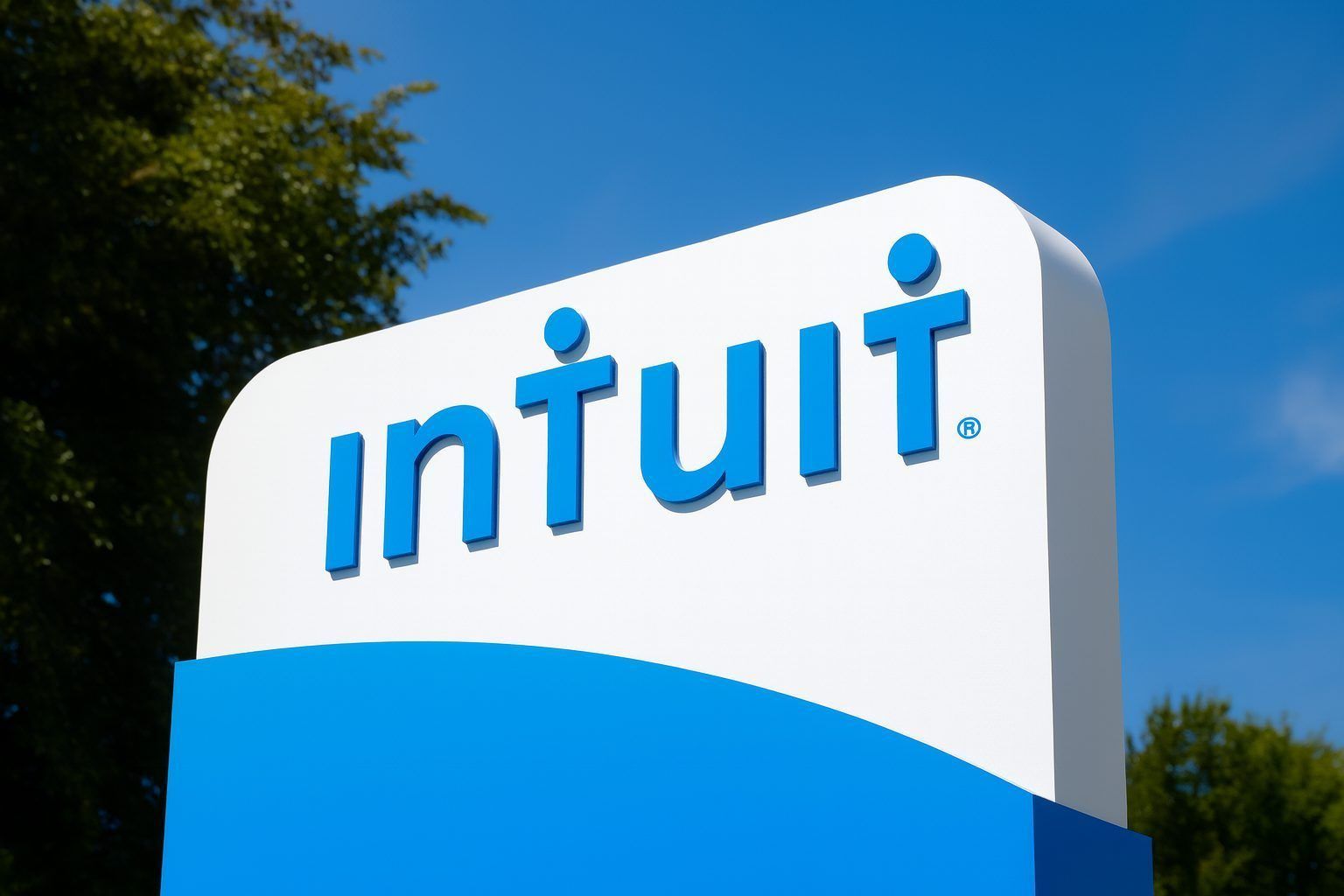On Tuesday, November 25, 2025, Intuit Inc. (NASDAQ: INTU) heads into the U.S. trading session riding a powerful mix of earnings momentum, fresh AI partnerships and brand‑new open banking news out of Australia. Here’s a detailed look at where the stock stands today, what’s driving sentiment, and the key developments investors should be watching.
INTU stock price snapshot for November 25, 2025
As of Monday’s close on November 24, ahead of today’s session, Intuit shares were trading around $653 per share, with an after‑hours quote near $653.18. That gives the company a market capitalization of roughly $182 billion. [1]
Over the last year, INTU has traded in a wide 52‑week range of about $532.65 to $813.70, leaving the stock roughly 20% below its peak and comfortably above the lows. [2]
Key valuation and fundamentals as of the latest data:
- Market cap: ≈ $181.9 billion
- Trailing P/E: ~44.8×
- Forward P/E: ~27.6×
- Dividend:$4.80 per share annually (~0.7% yield), with the next ex‑dividend date around January 9, 2026. [3]
Analysts tracked by StockAnalysis currently rate Intuit a “Strong Buy,” with an average 12‑month price target around $812, implying mid‑20% upside from Monday’s close. [4]
In other words: even after its recent pullback from the $800s, Intuit is still priced as a high‑quality, high‑growth fintech leader rather than a bargain bin value play.
What moved INTU just before today: Q1 FY26 earnings and AI buzz
Intuit’s current trading level is the result of a busy November:
Q1 FY26: a clean earnings beat
On November 20, 2025, Intuit reported first‑quarter fiscal 2026 results that decisively beat expectations and reinforced its AI‑driven growth story. According to the company’s official release, for the quarter ended October 31 Intuit: [5]
- Grew total revenue to $3.9 billion, up 18% year over year.
- Increased Global Business Solutions revenue (centered on QuickBooks) to $3.0 billion, up 18%.
- Lifted Online Ecosystem revenue to $2.4 billion, up 21%.
- Grew Consumer segment revenue to $894 million, up 21%.
- Nearly doubled GAAP operating income to $534 million (+97%).
- Expanded non‑GAAP operating income to $1.26 billion, up 32%.
- Boosted GAAP EPS to $1.59 (+127%) and non‑GAAP EPS to $3.34 (+34%).
Zacks’ recap highlighted that revenue also beat Wall Street estimates (about $3.88 billion vs. $3.76 billion expected) and that the non‑GAAP EPS of $3.34 topped consensus by $0.24. [6]
Management didn’t just beat expectations – it reiterated full‑year fiscal 2026 guidance, calling for: [7]
- Revenue of $21.0–$21.2 billion (up ~12–13%)
- GAAP operating income up ~17–19%
- Non‑GAAP operating income up ~14–15%
- GAAP EPS of $15.49–$15.69 (up ~13–15%)
- Non‑GAAP EPS of $22.98–$23.18
The message from the C‑suite is clear: Intuit believes it can sustain double‑digit revenue growth with expanding margins, powered largely by AI‑driven features embedded across TurboTax, QuickBooks, Mailchimp and Credit Karma.
Market reaction: AI‑driven “relief rally”
The day after the results, Intuit’s stock jumped as investors digested the beat and the AI narrative. Investopedia reported that shares were up about 6% in Friday trading as the market reacted to strong demand for AI‑powered tools in QuickBooks and other platforms. [8]
A separate global market recap noted Intuit climbing around 4% on earnings strength and AI integration into its tax and small‑business platforms, cementing INTU as one of the notable gainers in the wake of the report. TechStock²
Put together, the Q1 release and subsequent trading have reset the conversation around Intuit from “Can growth re‑accelerate?” to “How big can AI‑driven monetization really be?”
Fresh November 25 news: open banking rollout boosts QuickBooks in Australia
The big new headline dated November 25, 2025 that matters for Intuit today comes from its Australian business.
Intuit & SISS switch QuickBooks to open banking feeds
Australian tech and fintech outlets report that Intuit Australia has turned on open banking data feeds for QuickBooks, working with SISS Data Services as its outsourced service provider. [9]
Key details from today’s coverage:
- Intuit has activated open banking feeds for QuickBooks business customers in Australia.
- The new feeds use Australia’s Consumer Data Right (CDR) framework instead of “screen scraping.”
- Connections are already live with Commonwealth Bank of Australia and National Australia Bank, with 100+ additional institutions expected to follow. [10]
- Intuit gained Accredited Data Recipient status on 31 October 2025, and new QuickBooks customers are now required to share data via CDR as part of the sign‑up process. [11]
Existing QuickBooks customers are being encouraged (and prompted in‑product) to switch their legacy bank feeds to the new open banking feeds, which provide more accurate and timely data.
Why this matters for the stock
For investors, this is more than a regional technical tweak:
- Better data = better AI. Intuit executives explicitly describe open banking feeds as the “data foundation” for the company’s AI‑driven expert platform, aimed at transforming how businesses, accountants and brokers operate. [12]
- Faster, cleaner feeds reduce manual document chasing, errors and latency—pain points for accountants and finance brokers who influence software choice.
- Regulatory alignment with CDR strengthens Intuit’s ability to operate at scale in Australia’s tightly regulated data‑sharing environment.
In short, today’s open banking rollout headlines reinforce a core pillar of the investment thesis: Intuit is using regulation‑grade, first‑party data to feed its AI engines, not relying on fragile screen‑scraping methods that can break or face regulatory backlash.
The OpenAI mega‑deal: turning ChatGPT into a financial co‑pilot
Another major catalyst still driving sentiment into today’s trading is Intuit’s multi‑year partnership with OpenAI, announced last week.
Deal terms and scope
On November 18, 2025, Reuters reported that Intuit has signed a multi‑year deal worth more than $100 million with OpenAI to use its models, including those behind ChatGPT, to power AI agents across Intuit’s apps such as TurboTax, QuickBooks and Credit Karma. [13]
According to FintechNews Switzerland, key elements of the partnership include: [14]
- Intuit apps inside ChatGPT: Users will be able to access Intuit applications directly within ChatGPT and take secure, personalized financial actions.
- Expanded use of frontier models: OpenAI’s latest models will underpin Intuit’s AI agents for cash‑flow forecasting, tax prep, and payroll management.
- Trusted data environment: The tools will run under Intuit’s existing privacy, security and “responsible AI” frameworks, connecting the company’s proprietary financial data and credit models with OpenAI’s models.
PYMNTS and other fintech outlets frame the collaboration as an effort to turn ChatGPT into a “financial guru,” letting users estimate tax refunds, assess loans and improve cash‑flow management conversationally. [15]
Stock market takeaways
Market coverage from Reuters and other outlets highlighted that Intuit shares rose about 3–4% in premarket trading on the day the deal was announced, as investors digested the potential to deepen engagement with the company’s roughly 100 million customers and attract new ones via ChatGPT. [16]
A detailed column on Barchart argues that:
- The OpenAI partnership could open new growth channels by embedding Intuit’s apps where users already spend time (inside ChatGPT).
- At the same time, Intuit’s valuation remains rich, with forward valuation multiples still elevated versus the firm’s own five‑year averages, even after the recent pullback. [17]
For today’s session, the takeaway is that AI remains the central driver of Intuit’s narrative—and the OpenAI agreement significantly raises the stakes for execution.
Brand and data flywheel: LA28 Olympics & new ad‑tech distribution
While not dated today, two other November announcements are still relevant for how investors may view the stock on November 25.
LA28 Olympic & Paralympic Games partnership
Intuit recently announced a multi‑year partnership with Team USA and the LA28 Olympic and Paralympic Games, becoming a Founding Partner in the financial management software category. [18]
Highlights:
- The Intuit Dome, home of the Los Angeles Clippers, will host five‑on‑five basketball during LA28 and will retain the “Intuit” name during the Games—an Olympic first for venue naming rights. [19]
- The partnership adds a high‑visibility global marketing platform, reinforcing the Intuit brand with consumers and small businesses worldwide.
This doesn’t change near‑term earnings, but it underscores management’s willingness to invest in long‑term brand equity—important for a company competing across taxes, accounting, personal finance and marketing automation.
SMB MediaLabs and The Trade Desk
On November 24, Intuit also announced that SMB MediaLabs audiences are now available on The Trade Desk, giving advertisers programmatic access to Intuit’s first‑party small‑ and mid‑market business audience segments. [20]
This move:
- Monetizes Intuit’s rich first‑party data beyond its own apps.
- Strengthens Intuit’s Mailchimp and marketing ecosystem story.
- Adds another incremental revenue stream tied to advertising and data, rather than just subscriptions and payments.
For investors watching INTU today, it’s another sign that Intuit is trying to build a multi‑sided platform—not just point solutions for accounting or tax.
Analyst sentiment and valuation: bullish, but not cheap
Wall Street’s formal coverage of Intuit has been busy in the days surrounding the earnings and AI partnership.
RBC: “Outperform” with $850 target
A MarketBeat summary notes that Royal Bank of Canada has reissued an “Outperform” rating on Intuit with a $850 price target, implying around 26–27% upside from recent levels. The same report notes that the broader Street consensus sits around $796–$800 with an overall “Moderate Buy” rating. [21]
Wolfe Research: target cut but still bullish
Wolfe Research recently trimmed its price target from $900 to $870, but maintained a bullish stance. MarketBeat’s recap highlights that Wolfe’s $870 target still implies roughly 31% upside, and that consensus across analysts is a “Moderate Buy” with an average target near $798. [22]
Independent analysis: AI upside vs. premium multiples
The Barchart column on the OpenAI deal points out that:
- Intuit’s stock has pulled back from the $800 area to the mid‑$600s, a roughly 20% decline in about half a year.
- Even so, certain valuation metrics—especially forward P/E and price‑to‑sales—remain well above Intuit’s 5‑year averages, suggesting the market is still pricing in robust growth and successful AI execution. [23]
At the same time, StockAnalysis data shows more moderate but still elevated valuations (around 45× trailing earnings and 28× forward earnings). [24]
For today’s investors, the message is consistent: sentiment is broadly positive, but the stock is priced for continued execution. Surprises—good or bad—around AI adoption, Mailchimp performance, or macro pressure on small businesses can move INTU quickly.
Key themes for investors watching Intuit stock on November 25, 2025
Putting all of this together, here are the main themes to keep in mind if you’re tracking INTU today:
- AI at the core of the story
- Q1 FY26 showed double‑digit growth across core segments, with management explicitly tying performance to its AI‑driven expert platform. [25]
- The OpenAI partnership significantly raises expectations: Intuit must prove it can translate ChatGPT‑embedded experiences into higher customer acquisition, retention and monetization.
- Data moat deepening via open banking and first‑party audiences
- Today’s open banking rollout in Australia improves the quality, timeliness and regulatory robustness of QuickBooks data feeds—key fuel for AI models and for keeping accountants and brokers loyal to the platform. [26]
- The SMB MediaLabs integration with The Trade Desk underlines Intuit’s ability to monetize unique small‑business data in advertising and marketing use‑cases. [27]
- Brand and ecosystem expansion
- The LA28 Founding Partner deal and Intuit Dome’s naming‑rights win give the company a global stage and align the brand with world‑class events—useful when competing for consumer mindshare across taxes and personal finance. [28]
- Valuation and volatility risk
- Even after recent volatility, Intuit still trades at premium multiples versus both its own history and many software peers. [29]
- Analyst price targets cluster in the $800–$870 range, leaving room for upside but little tolerance for execution missteps.
- Macro sensitivity, especially for small businesses
- Intuit’s growth engine runs through small and mid‑market businesses. Any slowdown in new business formation or increased failure rates among SMBs could weigh on QuickBooks and related ecosystems, even if AI features are compelling.
Bottom line for November 25, 2025
As markets open on November 25, 2025, Intuit stock sits in a “prove‑it” sweet spot:
- The company just posted a blowout Q1 with strong AI‑linked growth.
- A $100M+ OpenAI partnership and new open banking feeds in Australia are expanding both its AI capabilities and data moat.
- Wall Street remains constructive to outright bullish, but valuations assume that Intuit will keep executing and that AI initiatives will pay off at scale.
For traders and long‑term investors alike, the next phase for INTU will likely be about evidence: real usage of ChatGPT‑embedded experiences, adoption of open banking feeds, continued margin expansion, and resilience in the face of any small‑business or consumer softness.
As always, this article is for informational and educational purposes only and is not investment advice. Anyone considering buying or selling Intuit stock should perform their own research and consider consulting a qualified financial advisor.
References
1. stockanalysis.com, 2. stockanalysis.com, 3. stockanalysis.com, 4. stockanalysis.com, 5. investors.intuit.com, 6. finviz.com, 7. investors.intuit.com, 8. www.investopedia.com, 9. www.mortgagebusiness.com.au, 10. ecommercenews.com.au, 11. www.mortgagebusiness.com.au, 12. www.mortgagebusiness.com.au, 13. www.reuters.com, 14. fintechnews.ch, 15. www.pymnts.com, 16. www.reuters.com, 17. www.barchart.com, 18. www.businesswire.com, 19. www.reuters.com, 20. investors.intuit.com, 21. www.marketbeat.com, 22. www.marketbeat.com, 23. www.barchart.com, 24. stockanalysis.com, 25. investors.intuit.com, 26. www.mortgagebusiness.com.au, 27. investors.intuit.com, 28. www.businesswire.com, 29. stockanalysis.com







